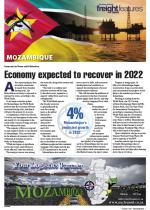A railway line linking the hinterland coalfields to the proposed new Macuse Port, which is currently under construction, is fast gaining traction in Mozambique.According to Greg Savad, CEO of TransRailnet International, an infrastructure construction and operating company looking to finance, build, operate and transfer various rail construction projects throughout Africa, the project is of vital importance for the logistics of the mining sector in Mozambique and to unlock the potential of the coal basin in the country.The company is working with Thai Mozambique Logistics (TML) which has been granted the concession to build a high-performance railway to transport coal and cargo between the Moatize/Chitima region and the new port to be built on the Macuse River.The Macuse Port is a proposed new export port for Mozambican coal, to be located on the coast of Zambezia province in Macuse near the city of Quelimane.“We are very excited about this development and are working closely with TML to deliver this rail solution. It will take the pressure off the existing highway system in the country, which is currently predominantly used for the transport of bulk minerals from the mines to the ports.”Savad said moving coal to rail also ensured a more competitive logistics cost.He said the project was already at an advanced stage, with all the necessary environmental and feasibility studies completed and all approvals already awarded – as well as the concession.Plans are also under way to extend the rail link across the rest of Mozambique up to the Zambian border. “Our goal is to have a second phase development where we connect the Zambian Copperbelt to the Mozambican line. This can even be further extended to connect the Democratic Republic of Congo as well as connecting to the natural resource areas of Zimbabwe.”Savad said the Peebco Energy Group was also on board and would utilise its patented, wind turbine, green energy technology to create an auxiliary/hybrid source of green electrical energy for both the operating trains and the Mozambique deepsea port.“Thus far, $100 million has already been injected into this endeavour for feasibility studies, environmental impact studies, consultant fees, and such.”Andrew Clothier, the engineer working on the project, said construction would take anything from three to four years for the 637km length of railway line. “We are very positive about the outlook for this project, especially considering the comeback that rail is making and the growing focus on development in Africa.”He said with most of the high-level studies on the project completed, the more complex and detailed engineering designs would be the next phase, taking the team one step closer to construction.Asked about the cost and financing of the project, Savad said it was all privately financed. “This is for several reasons, including that it is a more f lexible option. The cost of the project is significantly less than what was expected. We also have time to start with the basics and develop the project as we go along.”Plans are also under way to develop a mentorship and skills transfer programme to impact local communities in Mozambique. “Our ultimate goal is to make rail construction and rail operation a safe, long-term job prospect for Mozambicans,” said Savad.He said discussions with other governments of other countries were under way, but at present, the focus was entirely on Mozambique. “It is important to keep to bite-size chunks that are deliverable rather than trying to do too much too quickly. As TransRailnet we want to be involved in the holistic development of Africa. We want to start with a project on the ground and phase in other projects as we progress.”Our transportation expertise can help you cover long distances between material extractions and processing plants, while simultaneously increasing your transported load and unloading process speed. We operate in Mozambique and SADC countries, providing a professional cargo handling service to an extensive list of clients.• Leading transportation solutions from mine to port and everywhere in between• Operating in various mines in Mozambique• Hiring out of equipment• Long-standing relationships with clients• Over 25 years of experience• HSE compliantMOVING Flow Through the SADEC RegionWith our own offices strategically placed insouthern Africa, we cater for all your import andexport needs including VAT payments, bondfacilities, and digitized paperwork.FN4611SDMozambiqueThis rail solution will take the pressure off the existing highway system that is currently predominantly used for the transport of bulk minerals from the mines to the ports.– Greg Savad “A planned railway line between Macuse and Tete will take the pressure off the road network in Mozambique.

